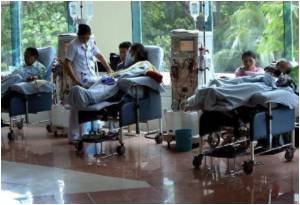In a pioneering initiative and first of its kind in CGHS Ghulam Nabi Azad will inaugurate a standalone haemodialysis centre CGHS Wellness centre in Delhi today.

Currently in India dialysis units are set up within hospitals mainly due to shortage of nephrologists leading to scarcity of dialysis units. CGHS beneficiaries often suffer hardship for dialysis as demand far exceeds the supply. CGHS refers quite a few of its beneficiaries to private empanelled hospitals.
In Delhi around 40 – 50 patients require dialysis per day. Further in years to come, need for dialysis is likely to go up in view of prevalent diseases like diabetes and hypertension which lead to chronic Kidney disease and renal failure. Therefore Public Health sector shall have to cater to significantly increased demand for dialysis and concept of standalone dialysis has been looked into for meeting this demand. In this model dialysis unit is not located in a hospital and therefore eliminating the need of availability of Nephrologist round the clock as Dialysis station is manned by trained medical and paramedical staff under the overall supervision of Nephrologists who ensure quality control as per laid down protocol. Without exploring the possibility of commissioning standalone dialysis units it may never be possible to meet this demand.
While identifying a private partner Apollo Hospitals scored better in overall support mechanism of Nephrologist, Human Resources, Referral, Complications Management, Performance Report and Grievance Redressal. Chronic renal failure is a disease where patient’s kidneys are either compromised or stop functioning and are unable to clear toxic wastes from the body. Dialysis is regarded as a "holding measure" until a renal transplant can be performed, or sometimes as the only lifelong supportive measure in those for whom a transplant would be inappropriate.
A space of 2400 sq. ft. covered area has been renovated to suit the requirements for providing state of art dialysis facility. It shall have a capacity to dialyze up to 21 cases of Chronic Renal Failure per day with seven functional Dialysis machines (and an additional stand by machine) and shall be operational from 7 A.M. to 8 P.M. for 310 days in a year. If maximally utilized it shall be able to undertake 6510 dialysis per year.
Dialysis machine works on the principle of the diffusion (Waste removal) of solutes and ultra filtration (Fluid Removal) across a semi permeable membrane, a thin layer of material that contains various sized holes, or pores through which smaller solutes and fluid pass through but blood cells, and large proteins can’t). Substances in water tend to move from an area of high concentration to an area of low concentration Blood flows by one side of a semi-permeable membrane, and a dialysate (dialysis fluid), flows by the opposite side, this counter current being beneficial for removal of urea and creatinine accumulation of which in blood are life threatening.
This joint venture would fruitfully cater to the need of maintenance haemodialysis of CGHS beneficiaries by in house management of such patients. This center would be extremely beneficial to CGHS patients of chronic renal failure by providing timely haemodialysis and mitigate suffering thereby improving the quality of life and productivity. This center shall also reduce dependence of CGHS on private empanelled hospitals and government hospitals.
Source-PIB









